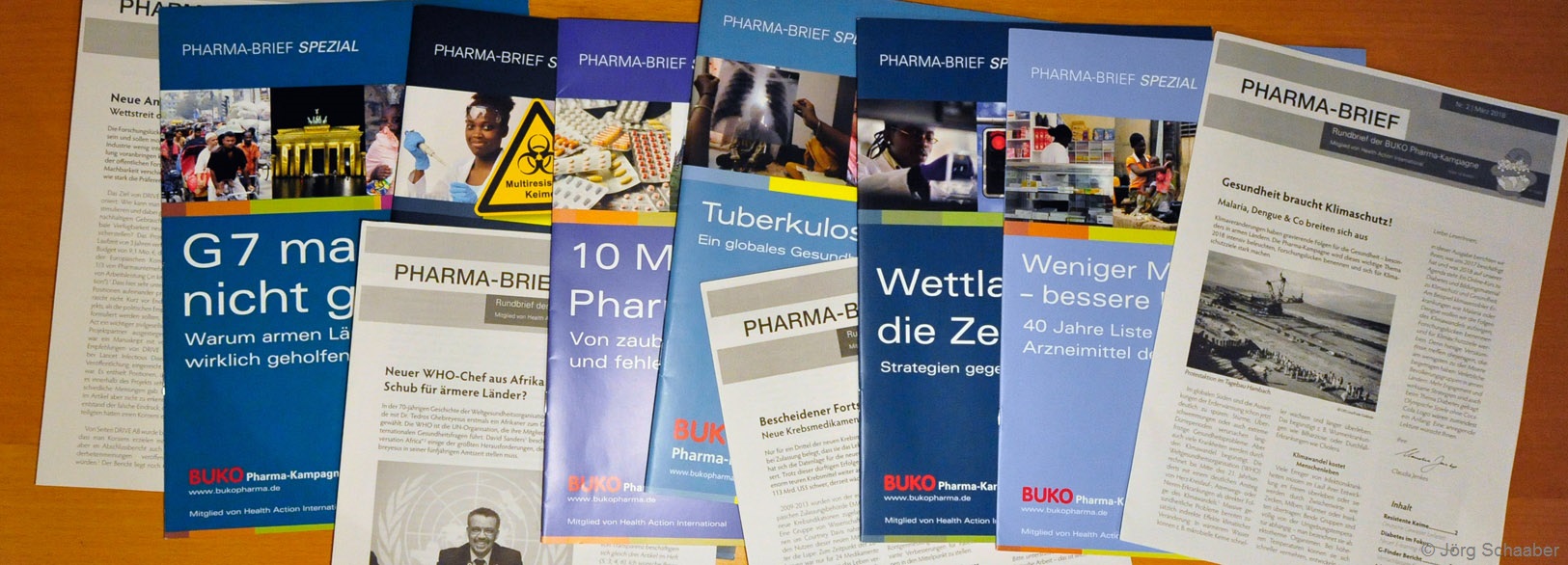10/2017: In Watte gepackt - Wem nützt die Beratung vor der Zulassung?

Der Pharma-Brief 10/2017 widmet sich folgenden Themen:
In Watte gepackt
Wem nützt die Beratung vor der Zulassung?
Eher unbemerkt von der Öffentlichkeit ist in den letzten Jahren eine Gesprächsschiene zwischen Pharmafirmen, Zulassungsbehörden und Erstattungsagenturen entstanden. Wer profitiert von der Diskussion über die Ziele von klinischen Studien? Weiterlesen
Alter Wein in neuen Schläuchen
USA: Altpräparate als Goldgrube
In den USA gibt es noch immer Arzneimittel, die nie auf Sicherheit und Wirksamkeit geprüft wurden. Denn sie waren schon auf dem Markt, bevor entsprechende Zulassungsbestimmungen eingeführt wurden. Die ungeprüften Arzneimittel sollen nun durch ein besonderes Verfahren nachträglich zugelassen werden. Doch das Vorgehen führt zu krassen Preiserhöhungen. Weiterlesen
Bezahlbare Medikamente
Niederlande diskutieren neue Strategien
Überteuerte Medikamente sind nicht nur ein Problem für Menschen in Armut. Selbst die reichsten Länder der Welt stoßen an die Grenzen dessen, was ihre Gesundheitssysteme finanzieren können. In den Niederlanden sucht das Parlament neue Wege, die Kostensteigerung für Arzneimittel zu stoppen. Weiterlesen
Sehstörungen und Blindheit
Welchen Einfluss haben die Lebensumstände?
Weltweit sind etwa 253 Millionen Menschen in ihrer Sehkraft eingeschränkt.1 Das macht Sehbehinderungen zu einer der am meisten verbreiteten körperlichen Einschränkungen weltweit. Prekäre soziale und ökonomische Lebensumstände haben einen großen Einfluss auf die Entstehung dieser Erkrankungen. Menschen in armen Ländern sind besonders häufig betroffen. Weiterlesen
Soziale Ungerechtigkeit tötet
Bessere Gesundheitsversorgung allein reicht nicht
Soziale Faktoren haben enorme Auswirkungen auf die Gesundheit. Wer arm ist, wird häufiger krank und stirbt früher. Ein besserer Zugang zu Gesundheitsversorgung kann zwar etliche Todesfälle verhindern, ändert aber am Grundproblem wenig, wie eine aktuelle Untersuchung aus England zeigt. Viel mehr Menschenleben retten könnten Maßnahmen, die die Kluft zwischen arm und reich verringern. Weiterlesen
Krebsmedikamente werden zu astronomischen Preisen verkauft. Das lädt zum Betrug ein, und so mancher hält dabei die Hand auf. Zwei Journalisten haben drei Jahre recherchiert. Sie entdeckten dabei nicht nur menschliche Abgründe und hemmungslose Bereicherung. Weiterlesen
Aus aller Welt
- Niederlande: Contra Pharma
- USA: Konzerne im Paradies
- Zika zum Zweiten
- USA: Militär-Spezialarznei
Download: Pharma-Brief 10/2017 [PDF/747kB]
Foto © J.Schaaber
Tuberculosis - A global threat (2008)
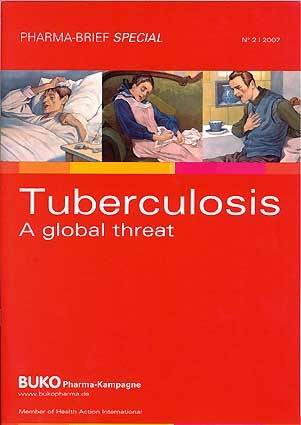
Download Brochure [PDF/ 1,3MB]
Tuberculosis - A social disease (2008)
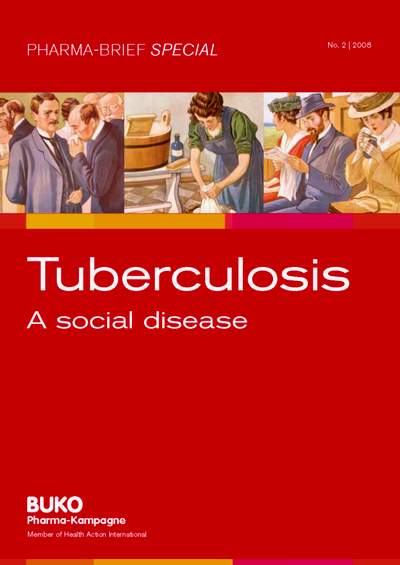
The fight against poverty, political strategies, better chances for education and equal rights for men and women are as urgent in the fight against TB as appropriate and affordable therapies.
Download Brochure [PDF/ 1,1MB]
Medical research: Science in the public interest - "Equitable licenses" for the results of publicly sponsored medical research (2009)
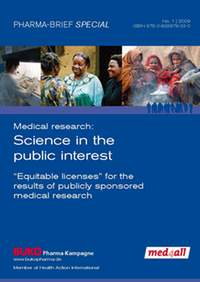
This brochure presents background information about challenges in the drug supply in poor countries. Numerous case studies show the US experience with new licensing models and highlight possible approaches for the specific German setting.
Download Brochure [PDF/ 1,3MB]
Malaria - From the heart of Europe to the Tropics (2010)
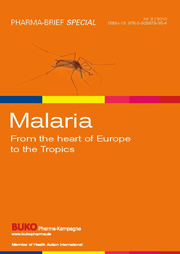 Malaria is considered to be a tropical disease today. In earlier days, however, it also caused much suffering in Europe. The marshes and moors of Northern Germany were dreaded malaria-infested regions up to the 19th century. Every second child in East Frisia is suspected to have been infected with the marsh fever during the epidemic in 1826. Similarly, outbreaks of malaria were quite frequent at the Upper Rhine. Fortunately, this is a thing of the past. On the southern hemisphere though, malaria is still harsh reality even today. Almost one million people die of a fatal mosquito bite each year, every 30 seconds a child dies. That is reason enough to take a look at the disease.
Malaria is considered to be a tropical disease today. In earlier days, however, it also caused much suffering in Europe. The marshes and moors of Northern Germany were dreaded malaria-infested regions up to the 19th century. Every second child in East Frisia is suspected to have been infected with the marsh fever during the epidemic in 1826. Similarly, outbreaks of malaria were quite frequent at the Upper Rhine. Fortunately, this is a thing of the past. On the southern hemisphere though, malaria is still harsh reality even today. Almost one million people die of a fatal mosquito bite each year, every 30 seconds a child dies. That is reason enough to take a look at the disease.
This Pharma-Brief Special gives information on prevention, therapy and supply problems, provides the background on current research projects and describes the history of malaria between colonial politics and military interests.
Download Brochure [PDF/ 1,1MB]
Pharma-Brief Spezial
Hier finden Sie eine separate Auflistung des Pharma-Brief Spezial. Dies sind Sonderausgaben, die sich auf unterschiedliche Themenschwerpunkte konzentrieren.
Pharma-Brief Archiv
Pharma-Brief Archiv
Unsere Fachzeitschrift Pharma-Brief erscheint acht Mal pro Jahr und bietet gut recherchierte Beiträge rund um das Thema globale Gesundheit. Sie informiert über Zugangsprobleme bei Medikamenten, Arzneimittelrisiken und Nutzenbewertung, mangelnde Transparenz des Arzneimittelmarktes, vernachlässigte Krankheiten, illegale Pharmageschäfte, internationale Gesundheitspolitik und auch über Projekte der BUKO Pharma-Kampagne. Zweimal jährlich erscheint außerdem eine Doppelausgabe mit dem Pharma-Brief Spezial als Beilage. Die Broschüren beleuchten jeweils ein Schwerpunktthema.
Abonnieren Sie den Pharma-Brief und bleiben Sie auf dem Laufenden!
Sie können hier alle Jahrgänge des Pharma-Briefes ab 1981 online lesen.

